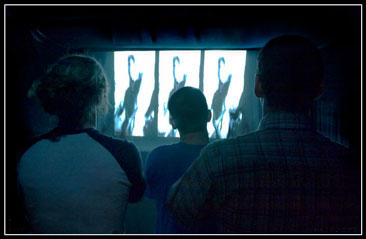| Applause Mini movie theater, archival video footage, custom electronics and software. |
 |
|||
Applause is an interactive group video installation that addresses issues of politics and control in our daily lives. Visitors walk into a mini movie theater and approach three microphones facing three vertically stretched freeze-frame videos. Small signs instruct the visitors to applaud to begin the show. Claps into the microphones progress the corresponding movies, and archival film footage plays. Boys throw each other in the air, run around a campground and laugh together. Groups of children gather in anticipation of an exciting event. |
||||
| At once, the film footage rolls on its own, cuts to full frame, and the boys turn to look at a smiling Hitler. The footage is from Leni Riefenstahl's classic documentary "Triumph of the Will," and the video progresses to military marches and an emphatic speech by Hitler espousing the Nazi cause. The video fades to black and concludes with several written quotes, including the above statement. We have tricked people into applauding and facilitating something they probably don't support. While visitors may leave feeling guilty or betrayed, people are often tricked into supporting other people's choices. Through either action or inaction, we are all part of a crowd, and it is our own personal voices that must be heard amidst the sea of noise. Press Exhibitions Collision Seven, chance. Art Interactive Gallery Cambridge, MA. April 2-10, 2005. |
 |
|||
   stuff • home |
||||
